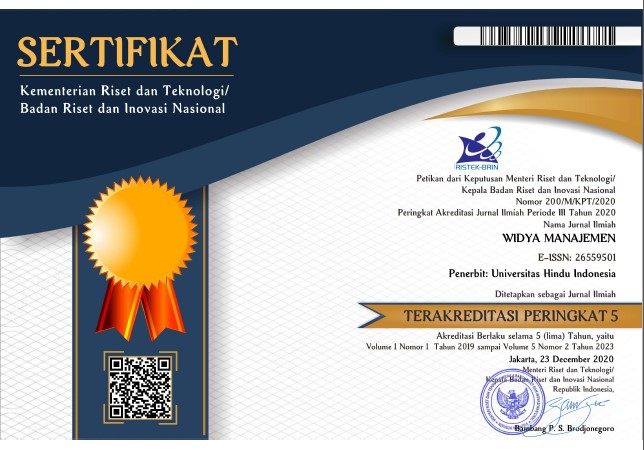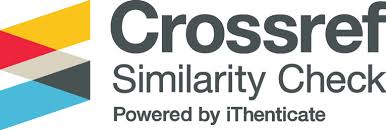Pengaruh Employee Engagement Terhadap Organizational Citizenship Behavior (OCB) Pegawai Di Rutan Kelas IIB Humbang Hasundutan
Abstract
One of the factors that make employee organizational citizenship behavior exist in carrying out duties and responsibilities in the organization is employee engagement. It is necessary for every employee to have an employee to encourage OCB attitudes. This study aims to determine employee engagement's effect on the organizational citizenship behavior of employees in Rutan Class IIB Humbang Hasundutan. The research method is a descriptive quantitative research method consisting of six data analysis techniques using IBM 26 SPSS. In the results of the significance test, the calculated value > t-tabel (7.759 > 0.266) with a ratio of the significance of 0.000 < 0.05. This indicates that H0 is rejected and Ha is accepted which means that there is a significant influence of the employee engagement variable on the organizational citizenship behavior of employees in the Class IIB Detention Center Humbang Hasundutan.
References
Alshaabani, A., Naz, F., Magda, R., & Rudnák, I. (2021). Impact of perceived organizational support on OCB in the time of COVID-19 pandemic in Hungary: employee engagement and affective commitment as mediators. Sustainability, 13(14), 7800.
Azwar, Saifuddin. (2016). Metode Penelitian. Yogyakarta: Pustaka Pelajar.
Creswell, J. W. (2014). Research Design: Quantitative, and Mixed Method Approaches (4th ed.). SAGE publications.
Fauziridwan, M., Adawiyah, W. R., & Ahmad, A. A. (2018). Pengaruh Employee Engagement dan Kepuasan Kerja Terhadap Organizational Citizenship Behavior (OCB) Serta Dampaknya Terhadap Turnover Intention. Jurnal Ekonomi, Bisnis, dan Akuntansi, 20(1).
Hai, S., Wu, K., Park, I. J., Li, Y., Chang, Q., & Tang, Y. (2020). The role of perceived high-performance HR practices and transformational leadership on employee engagement and citizenship behaviors. Journal of Managerial Psychology.
Mahayasa, I. G. A., & Suartina, I. W. (2019). Peran Organizational Citizenship Behavior (OCB) Dalam Peningkatan Pencapaian Tujuan Organisasi: Sebuah Kajian Literatur. JUIMA: Jurnal Ilmu Manajemen, 9(2).
Putri, N. E., & Wilopo, U. N. K. R. W. (2021). The Impact of Organizational Culture on Employee Engagement and Organizational Citizenship Behavior (A Study on XYZ Manufacturing Company). In International Conference of Economics, Business, Social, and Humanities, virtual. k (Vol. 210805).
Robbins, S. P., & Judge, T. A. (2015). Organizational Behavior Sixteen Edition (Perilaku Organisasi Edisi Ke-16). Jakarta: Salemba Empat
Sariani, N. L. P., Mahayasa, I. G. A., Maheswari, A. I. A., Astakoni, I. M. P., & Utami, N. M. S. (2022). Antecedent of Organizational Citizenship Behavior Variables: Gender as Moderator. Journal of Social Science, 3(3), 516-533.
Solichin, M. R. (2018). Analisis pengaruh employee engagement, emotional intelligence, dan komitmenn terhadap organizational citizenship behavior (OCB) pada karyawan PO Efisiensi Cabang Kebumen. Jurnal Ekonomi Dan Teknik Informatika, 6(2), 36-47.
Sugianingrat, I. A. P. W., Widyawati, S. R., da Costa, C. A. D. J., Ximenes, M., Piedadde, S. D. R., & Sarmawa, W. G. (2019). The employee engagement and OCB as mediating on employee performance. International Journal of Productivity and Performance Management.
Uddin, M. A., Mahmood, M., & Fan, L. (2018). Why individual employee engagement matters for team performance? Mediating effects of employee commitment and organizational citizenship behaviour. Team Performance Management: An International Journal
Reproduction Policy
Every author submitting articles to Widya Manajemen must make a statement that the manuscript is free from plagiarism and is not being considered and published in other journals.
Articles that have been published are copyrighted by the Program Studi Manajemen FEBP UNHI. For educational purposes, the contents of the article may be duplicated or reproduced as long as the source of the article is mentioned. Written requests must be submitted to the editor to obtain permission to republish the contents of the article for purposes other than educational purposes.
-----------------------------------------------------------------------------------------------------
Kebijakan Reproduksi
Setiap penulis yang menyerahkan artikel ke Widya Manajemen harus membuat surat pernyataan bahwa naskahnya bebas dari plagiarisme dan tidak sedang dipertimbangkan dan dimuat dalam jurnal lain.
Artikel yang telah dipublikasi menjadi hak cipta Program Studi Manajemen FEBP UNHI. Untuk tujuan edukatif, isi dari artikel dapat digandakan atau direpublikasi selama menyebutkan sumber dari artikel tersebut. Permintaan tertulis harus diajukan kepada editor untuk memperoleh ijin merepublikasi isi dari artikel untuk tujuan lainnya selain tujuan edukatif.






.jpg)









